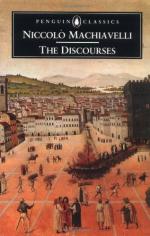
|
| Name: _________________________ | Period: ___________________ |
This quiz consists of 5 multiple choice and 5 short answer questions through Book One, The Development of Rome's Constitution, The Use and Abuse of Dictatorship, The Road to Ruin, Sundry Reflections Based on the Decemvirate.
Multiple Choice Questions
1. What does Machiavelli suggest causes corruption?
(a) Princes who are preoccupied with seeking pleasure rather than power.
(b) Princes who are not cruel enough with punishment.
(c) Rebellious citizens who defy ruling authorities.
(d) An insufficiency of or inability to enforce laws that deal effectively with corruption.
2. According to Machiavelli, how did the Agrarian Laws violate the foundation of well-ordered Republics?
(a) Agrarian laws distributed land from those who had more than the law allowed among plebes rather than among Nobles with which they could enrich themselves.
(b) Agrarian laws allowed the government to decide what was to be grown on land in spite of the expertise of the land owner.
(c) Agrarian laws allowed Nobles to take land from Plebes with the intent to increase the land's productivity.
(d) Agrarian laws allowed land owners to use their land to help the poor become wealthy.
3. How long did Sparta peacefully exist without changing its laws, according to Machiavelli?
(a) Through the reign of Lycurgus.
(b) 800 years.
(c) Until its domination by Rome.
(d) 350 years.
4. What are three reasons that Machiavelli gives for cities becoming unhappy?
(a) When leaders drain resources to fight wars, when laws become tools for Princes to become more wealthy, when there is taxation without representation.
(b) When taxes drain Plebes of their wages, when resources are not allocated equitably, and when Princes seek to expand their influence with wars.
(c) When cities are compelled to reorganize laws by themselves, when the laws diverge from their established institutions, and when the laws lead cities from the right path.
(d) When cities face armed challenges from outside institutions, the courts do not act justly, and when leaders abuse their power.
5. According to Machiavelli, how did the Nobles of Rome attempt to correct the limit on the wealth that was placed on them by Agrarian Laws?
(a) The Nobles took political control over the Senate and changed the laws to allow Nobles to control all the land of the Empire.
(b) They reduced taxes on themselves and used their increased wealth to buy back their land.
(c) They raised taxes on Plebes who used the land awarded to them by the Agrarian Laws.
(d) Rome would send out armies to colonize lands that were then distributed to Nobles.
Short Answer Questions
1. What are two reasons Machiavelli gives for foreign forces building a city?
2. Of what should Princes be most ashamed in Machiavelli's view?
3. What did Machiavelli identify as the cause of conspiracy against a hereditary Princes?
4. How does Machiavelli predict a citizen will conduct himself if he is not punished for his misdeeds because of his reputation for doing good deeds, according to Machiavelli.
5. From what did Machiavelli develop the information that he wrote into "The Discourses"?
|
This section contains 690 words (approx. 3 pages at 300 words per page) |

|




